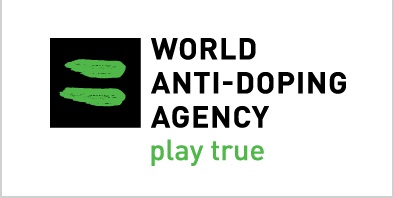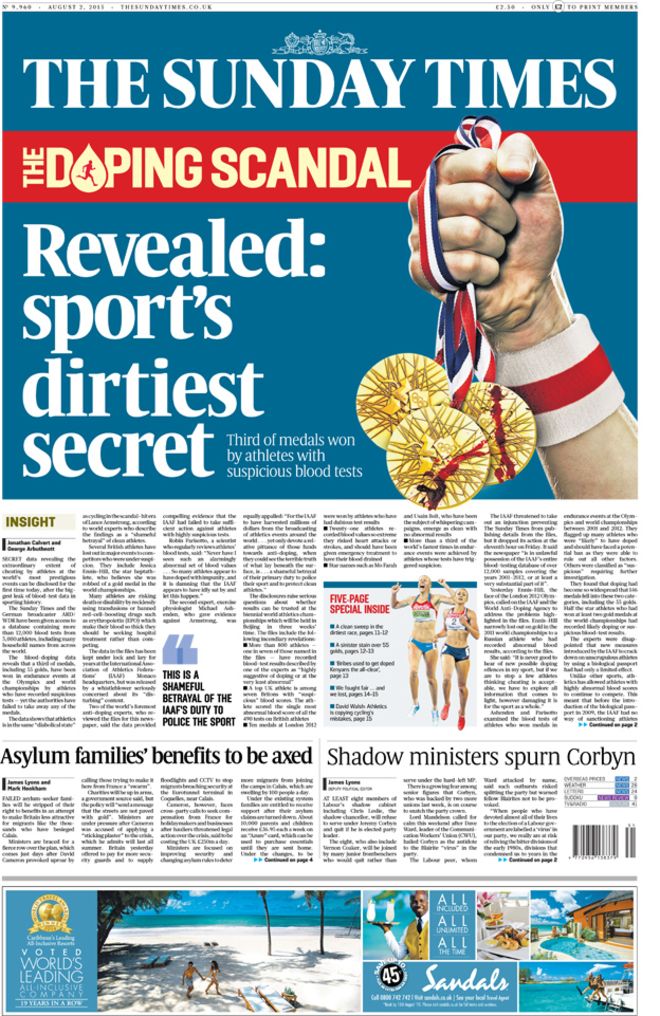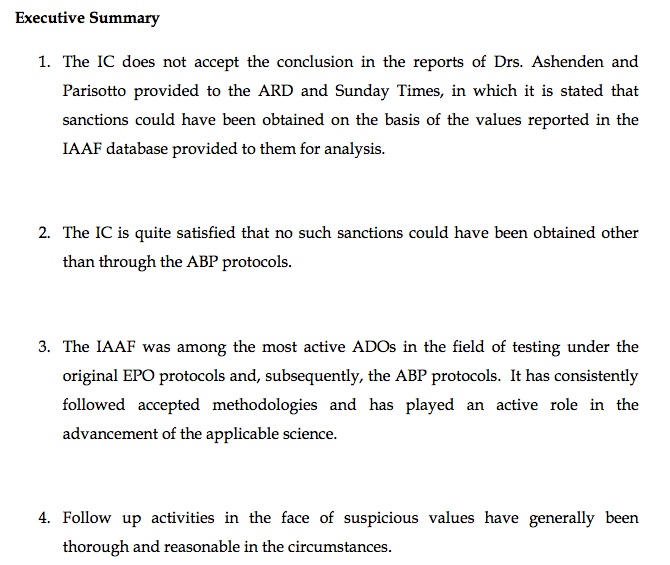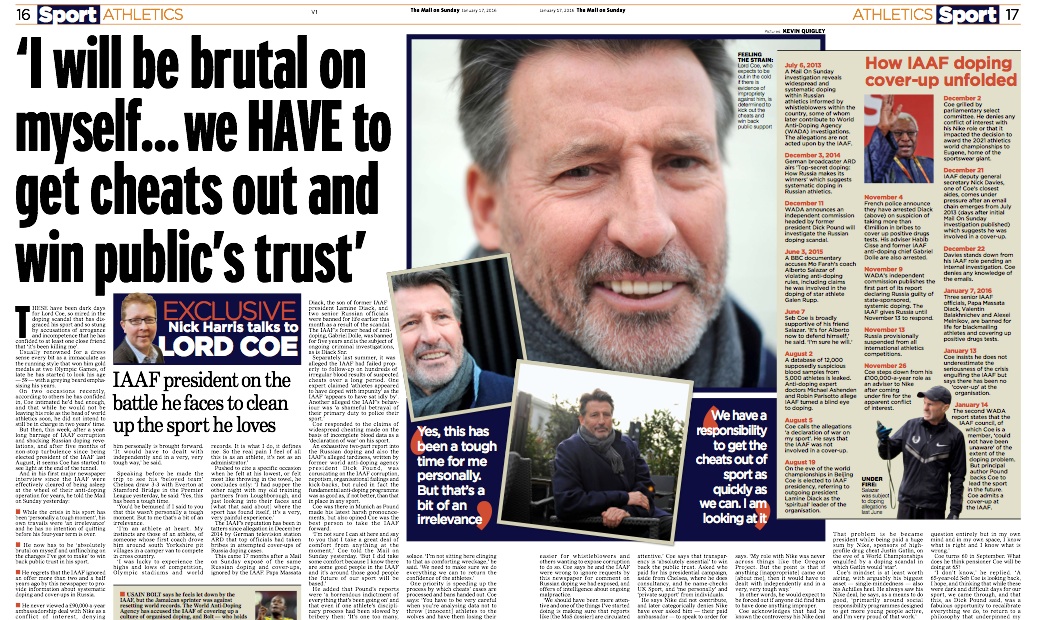By Ross Tucker (left, professor, Uni of the Free State, South Africa)
& Roger Pielke Jnr (right, professor, University of Colorado-Boulder)
25 January 2016
.
 The big news in global track and field today is that Adidas will end their sponsorship of the world governing body, the IAAF, four years early, according to a story broken last night by the BBC. We can speculate ad finitum on whether this is a calculated business decision based on the fact that the average of a track field fan these days is 55 (source: IAAF), or whether Adidas, long-time sponsors of FIFA, are taking a moral stance on sport.
The big news in global track and field today is that Adidas will end their sponsorship of the world governing body, the IAAF, four years early, according to a story broken last night by the BBC. We can speculate ad finitum on whether this is a calculated business decision based on the fact that the average of a track field fan these days is 55 (source: IAAF), or whether Adidas, long-time sponsors of FIFA, are taking a moral stance on sport.
But make no mistake that the ins and outs of any sportswear deal, while symbolically important, are but a sideshow to the fundamental problems facing this sport today. Its very credibility is at stake, its leadership under question and both those things a result of doping scandals and the IAAF’s response to them.
The release earlier this month of the second instalment of an investigation by an Independent Commission (IC) of the World Anti-Doping Agency (WADA) into corruption in the IAAF (here in PDF) has led to a polarised debate. Much of the discussion has focused on the role of the IC chair, Richard Pound, and particularly his unexpected support of Sebastian Coe as president of the IAAF. (The press conference in which he proffered this support is available in full in the video below.) Others raised the thorny issue of possible IAAF non-compliance with the WADA Code.
Here we address a part of the WADA IC report that has received comparatively less attention – its Part III, which offers a full-throated defence of the IAAF against allegations first levied by Hajo Seppelt, an investigative journalist whose documentaries on the IAAF have aired on German TV channel ARD, and the Sunday Times.
The allegations centre on a trove of leaked blood data from elite athletes from 2001-2012. The leaked data was used by Seppelt and the Sunday Times to suggest that the IAAF had been derelict in its duty to root out doping in elite athletics. We offer a somewhat more nuanced interpretation of the blood data issue than is found in the WADA IC report.
.
.
The IC report said: “It is not credible that [IAAF] elected officials were unaware of the situation affecting Russian athletes.” The report concluded: “The IAAF council could not have been unaware of the extent of doping in athletics and the non-enforcement of applicable anti-doping rules.” As others have noted, it was bizarre when Pound’s public comments upon delivering the report then almost completely undercut its findings.
Pound’s mixed messages concerned Lord Coe, a member of the IAAF Council since 2003 and thus among those the report said must have been aware of the systemic corruption. Emails obtained by the Associated Press last week through a Freedom of Information request (story here, and samples of documents here) show that Seb Coe was being directly updated on reports about corruption and cover-ups as they were being reported. Coe is now the president of the IAAF. He served as one of four simultaneous IAAF vice-presidents to his predecessor as president, Lamine Diack, who is central to some of the allegations in the WADA report.
Pound’s endorsement of Coe, not surprisingly, created headlines from the press conference.
What can explain Pound’s about face? Is he conflicted as part of the old boy network of international sport? Is it the fact that, even after delivering a tough report, Pound is ultimately still a sport insider, far from an “independent” evaluator? Or is it just an inability of a man in the spotlight to have the discipline to keep separate the sharing of rigorous findings from his own speculative opinions?
One answer to these questions may be found in Part III of the IC report, which focuses on allegations made in a German documentary and by the Sunday Times. Working with Michael Ashenden and Robin Parisotto, two Australian scientists with considerable expertise in the science of doping and its regulation by sports authorities, the Sunday Times examined a leaked database of blood data taken from athletes over the period 2001 to 2012.
The newspaper concluded, via their experts, that the data indicated a wide prevalence of doping among athletes and that the IAAF should have done more to prosecute and police the incidence of doping. The Pound report strongly disagreed with the Sunday Times, where the claims were front-page news over several weeks, and identified the IAAF as “extremely active” in the fight against doping during that time period.
We are unlikely to be alone in having a difficult time squaring the WADA report’s shocking allegations of corruption in the IAAF, including revelation of a cover-up of doping results, with its impassioned defence of the IAAF as a leading federation in the fight against doping.
Logically, it is possible that much of the IAAF’s anti-doping efforts were so far removed from the corruption of the organisation’s leaders that it would, if viewed independently, be worthy of commendation.
 That they were among the first to adopt the Athlete’s Biological Passport (ABP) as an anti-doping tool is a notable positive, as noted in the IC’s final executive summary, left (click to enlarge). Whether that tool was used sufficiently remains a question worth further discussion, and one on which people will likely disagree. To suggest that the IAAF acted appropriately in response to its own database is also to ignore the fact that individuals within the organisation were able to develop strategies to delay the anti-doping sanctioning process, manipulate sanctions to prevent scandal, and even extort own athletes who had doped.
That they were among the first to adopt the Athlete’s Biological Passport (ABP) as an anti-doping tool is a notable positive, as noted in the IC’s final executive summary, left (click to enlarge). Whether that tool was used sufficiently remains a question worth further discussion, and one on which people will likely disagree. To suggest that the IAAF acted appropriately in response to its own database is also to ignore the fact that individuals within the organisation were able to develop strategies to delay the anti-doping sanctioning process, manipulate sanctions to prevent scandal, and even extort own athletes who had doped.
The IAAF even blocked publication of a commissioned study in 2011 on doping prevalence, which was only released last year by the UK Parliament.
There is, thanks to the narrow mandate of the WADA IC, no indication of whether anti-doping corruption extended beyond Russia, and how deep the problem may go. As a result, no complete judgment on the IAAF’s overall performance in anti-doping can be made, other than to say that potentially hundreds of athletes have been denied access to events, medals and prize money.
On the issue of the leaked blood doping data, we agree, in places, with the expert views expressed in the Sunday Times and, in places with the IAAF and WADA response. We also disagree with each, in places.
Here is where we agree with WADA and the IAAF: The leaked blood data almost certainly could not have been used to secure formal sanctions against individual athletes under the IAAF and the Court of Arbitration for sport. Thus, statements made in Sunday Times, and the unfortunate involvement of Paula Radcliffe, has served as a huge distraction. Where we disagree is with WADA’s emphasis on the Sunday Times reporting, rather than the implications of the blood data for the IAAF.
We also agree with the IAAF when it wrote in its response to the Sunday Times and ARD (via this link): “ARD and the Sunday Times admit in their reports that the scientists’ evaluation of the data cannot constitute proof of blood doping – with which the IAAF respectfully agrees – and they have otherwise run a statistical analysis of the likely prevalence of blood doping in athletics which is not dissimilar to the study which the IAAF conducted itself (and published externally) almost four years ago.”
But based on that earlier IAAF study, we disagree when WADA declares the IAAF response to the Sunday Times to be “scientifically sound.” Specifically, the IAAF response stated that “pre-2009 blood values could not be said to be reliable evidence of doping in and of themselves.” Yet, in stark contrast to this statement, in the 2011 peer-reviewed academic paper the IAAF said exactly the opposite about blood data that it had collected since 2001: “Today, the high standardisation of the blood tests makes possible the estimation of the prevalence of blood doping by using epidemiological measures of occurrence.”
That 2011 paper looked at the overall data to estimate the prevalence of blood doping among elite athletes, and found a rate of 18-19% among elite track and field endurance athletes, an estimate consistent with another 2011 study that IAAF refused to allowed to be published, as well as more recent research.
WADA’s IC report Part III appears to contradict itself further when it admits that the blood data does indeed provide evidence that as many as 158 medalists in top competitions prior to 2009 displayed blood values that were, in the words of the WADA report, “atypical” and “suspicious.”
Admittedly, 88 of these 158 medalists retired before targeted follow-up testing could be conducted, placing them beyond the IAAF’s anti-doping testing program. However, of the remaining 70, that the WADA report itself suggests that “many of these could have been included among the ‘suspicious’ athletes identified by Ashenden and Parisotto.”
The WADA IC report finds the blood data to be at once unreliable but also reliable enough to identify 158 suspicious medal winners. This is not just inconsistent, but contrary to the research conducted by the IAAF, whose 2015 iteration of its flagship event, the world athletics championships, was staged amid an ongoing drugs scandal. (Bolt v Gatlin, pictured, was characterised as one simplistic Good v Evil narrative in China).
Whether the IAAF should have done more with respect to these athletes is a judgment call on which reasonable people will (and do) have differing opinions. All parties appear to agree that the incidence of doping is far in excess of athletes charged or sanctioned. Whether this is a problem or not is a separate matter.
It is unfortunate that WADA, far from a disinterested party, decided to adjudicate a dispute between the two Australian experts and the IAAF, as played out in the media. The experts that WADA brought together to weigh in on this dispute included Ashenden, and eight scientists and lawyers from the IAAF and WADA. Not a single independent expert was consulted. The involvement of interested parties only, heavily slanted to one side, likely contributed to the IC conclusions lacking in nuance or balance.
The focus of Part III was, like Pound’s behavior at the press conference, focused on exonerating the IAAF against claims rather than focusing on the bigger issue – that there are, according to the IAAF, perhaps more than 150 medal winners out there who have never been publicly identified or sanctioned. Based on recent academic research, this number is surely an underestimate of the actual number.
To us, the far more important issues here are that doping appears to be endemic and policies and regulations in response simply don’t work (and even if they did, we lack the evidence base to show that).
It is fair to conclude that the Sunday Times overstepped in its conclusions in applying a partial database to reach definitive judgments on the credibility of the sport. Ashenden, Parisotto and the IAAF each have made valid points in response in their exchanges with each other.
At the same time, the leaked blood data, along with IAAF and independent research, clearly indicates a troubling degree of doping that went unaddressed, with well over 100 medal winners taking the podium having broken the rules. WADA’s role as a partisan has unfortunately obscured many of these points and all of the nuance.
The WADA report clearly indicates that insiders like Pound, despite an appetite for rooting out the worst corruption, are only willing to go so far in the questions that they will entertain.
Whatever explains Pound’s defence of Coe and the unbalanced Part III of his report, what remains clear is that no sport wants to confront the demons that haunt its governance. Sport insiders routinely look to those who are familiar for leaders to address undeniable problems in governance. We have seen that in FIFA over the past several years and now are witnessing it again in IAAF and WADA.
Pound’s report, even with its flaws, raises crucially important questions for sport. Should Russian athletes be at the Rio Olympics? Should track and field as a whole even be at Rio? Does the IAAF need to be rebuilt from the ground up? And, uncomfortable as it may be to some, should Sebastian Coe actually continue to lead the sport, for all his vows he is the right man?
These questions cannot be answered by the same people who were complicit in the scandals that have been revealed to date. Nor should they be answered by their friends and colleagues.
It is time to thank Dick Pound and other insiders for delivering their shocking report, and hand off their findings to a new generation of leaders in athletics, one which has a greater voice for athletes and others most directly affected by the governance of the sport that provides their livelihood and the pleasure of competition enjoyed by us all.
Whether Adidas have any part to play in that is more likely to be determined by economics than ethics.
.
Ross Tucker is a professor of exercise science at the University of the Free State, South Africa. His research interests include elite performance physiology and doping in sport. He also works as a scientific and research consultant to World Rugby. He has written extensively on doping and high performance management for The New York Times, The Guardian, The Washington Post, and Newsweek Europe among many other places, and has spoken at numerous international sports science conferences and high performance meetings on these subjects. Follow Ross on Twitter: @scienceofsport and on his website, The Science of Sport
.
Roger Pielke Jr. is a professor of environmental studies at the University of Colorado, where he also directs its Center for Science and technology Policy Research. He studies, teaches and writes about science, innovation, politics and sports. He has written for The New York Times, The Guardian, FiveThirtyEight, and The Wall Street Journal among many other places. He is thrilled to join Sportingintelligence as a regular contributor. Follow Roger on Twitter: @RogerPielkeJR and on his blog
.








